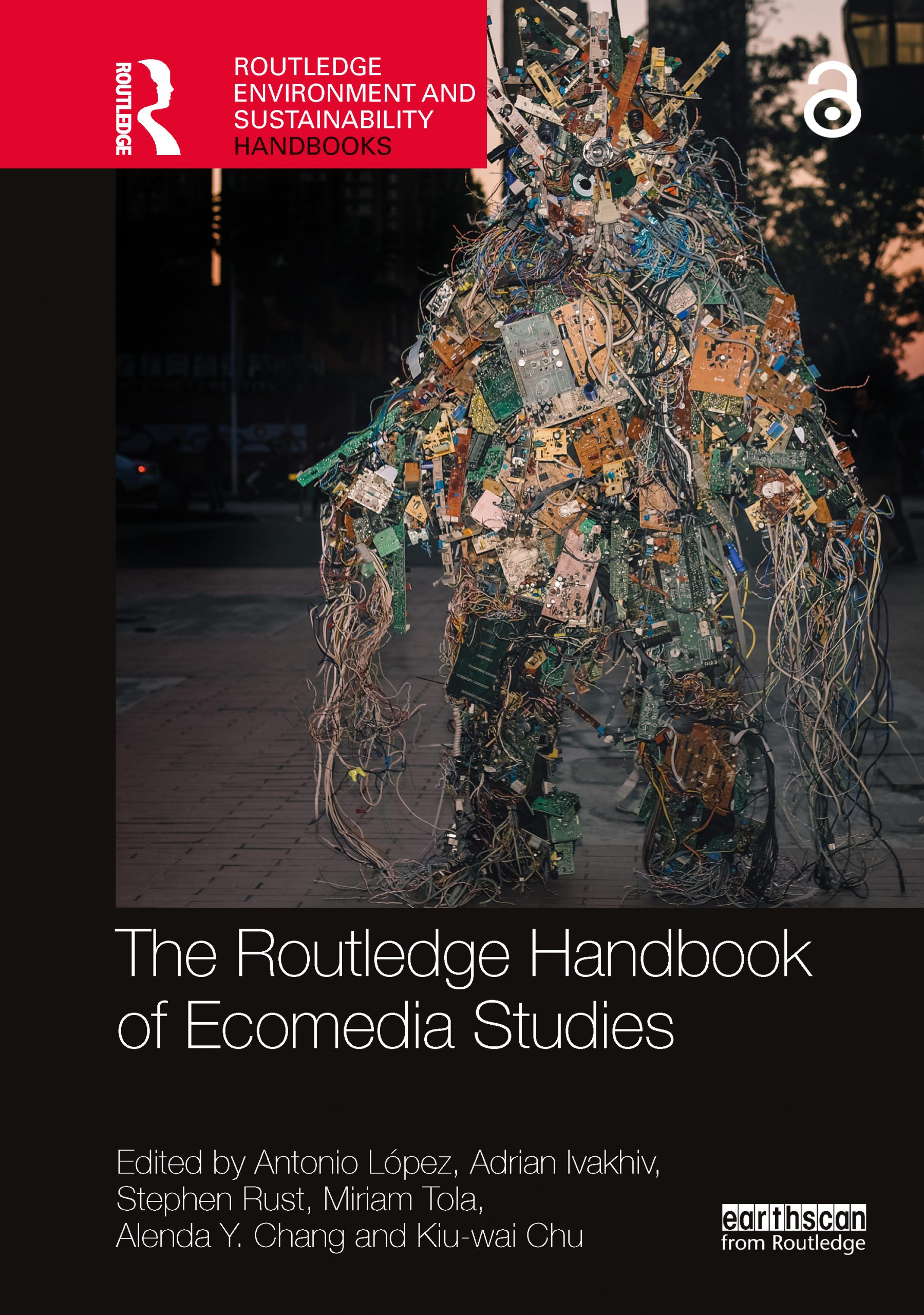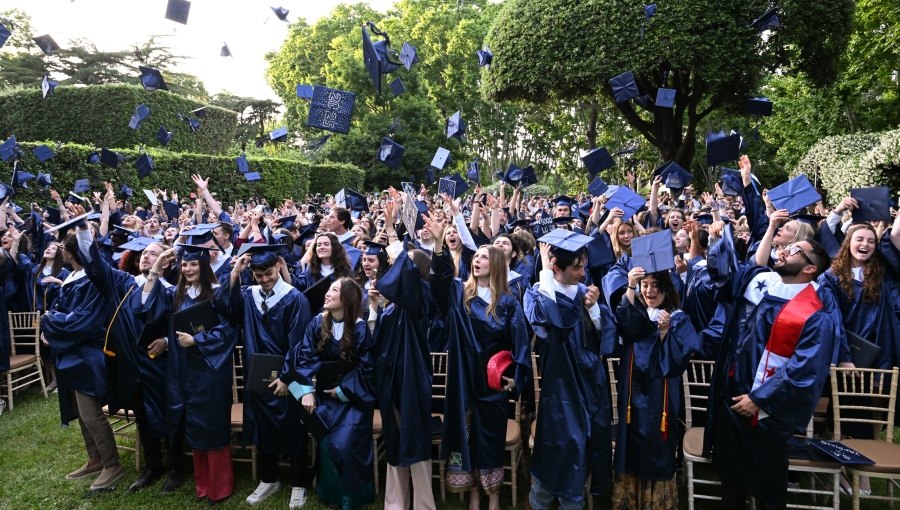Professors Antonio Lopez and Miriam Tola Co-edit Routledge Handbook of Ecomedia Studies
John Cabot University Communications and Media Studies Professors Antonio Lopez and Miriam Tola co-edited The Routledge Handbook of Ecomedia Studies (Routledge, 2023), which was released in September as an open-access e-book, as well as a regular print version. The editorial team includes international scholars Adrian Ivakhiv, Stephen Rust, Alenda Y. Chang, and Kiu-wai Chu. According to the editors, the purpose of this publication is to create short accessible chapters that introduce the varied ways that media and environment intersect and to offer a state-of-the-art snapshot of the field of ecomedia studies.
Lopez said that our climate crisis demands open scholarship that addresses how digital technologies and the media contribute to the planetary climate emergency. “Few realize how much our gadgets harm peoples and the environment,” Lopez said. “This book can generate conversations about how to solve these problems, while raising attention about how certain populations and ecosystems are sacrificed and destroyed for the global economy.”
This “ecological reboot” of media and communications disciplines is seen as crucial at a time when our global environment is distressed to the point that we are experiencing widespread temperature increases, forest fires, flooding, and unprecedented loss of biodiversity. As Jennifer Gabrys writes in her chapter, “The media ecologies discussed here are ecologies in crisis.” In this sense, ecomedia studies is a “crisis discipline” in that it acknowledges that the climate emergency is real and needs to be addressed.

Ecomedia studies is an emerging, interdisciplinary field that grapples with the impact of communication technologies on regional and global ecosystems, topics that have historically been marginalized in media disciplines. Leading scholar Sean Cubitt, one of the founding theorists of ecomedia studies, states in the book’s “Afterward,” “In 25 years, ecomedia has become core business for media and cultural studies, as feminism did before it.” Using the lens of ecojustice, the editors connect the ecological impacts of media with gender, race, and inequality.
The volume is the outcome of three years of work by the editors, who solicited scholarship in five critical areas of ecomedia research: ecomedia theory, ecomateriality, political ecology, ecocultures, and eco-affects. Chapters feature explorations of various types of media, such as videogames, film, experimental cinema, photography, artificial intelligence (AI), maps, music, and television. They also explore the environmental impacts of digital infrastructures, like the data cloud and streaming services. Additionally, authors investigate labor exploitation, electronic waste, resource extraction, and income inequality.
In particular, they wanted to draw connections between media studies and environmental humanities with Black media philosophy, post-and decolonial ecocriticism, affect studies, ecofeminism, and the recent turn in social science and humanities to incorporate a material perspective into their scholarship. This means paying attention to the various ways media’s materiality matters as much as its message and that the two cannot be separated. Each chapter offers a short list of recommended readings to direct readers to further research.
The handbook consists of 36 chapters by over 50 authors. Notably, the book combines the work of leading scholars in the field with young, emerging academics. The editors strived for geographical diversity, especially from the Global South and East, featuring scholarship from Africa, Asia, the Indian Subcontinent, Australia, and South America. Indigenous contributors were also crucial to the book’s formation.
The editors set out to ensure that the book is available as open access. They wanted to make sure the material would be available to as wide of an audience as possible and accessible to people in lower-income regions of the world. The editorial team was able to assemble funds from their various institutions, including a grant from JCU’s Frank J. Guarini School of Business. In another JCU connection, Communications alumna Elisabetta Petrucci was the book’s editorial assistant.
Professor Lopez’s chapter, “Ecomedia Literacy: Bringing Ecomedia Studies into the Classroom,” demonstrates how ecomedia studies can be incorporated into any media class. Communications Professor Miriam Tola co-authored the chapter,“Centering Africa in Ecomedia Studies: Interview with Cajetan Iheka.” It offers insights into the important contribution to the field of African scholarship.
Lisa Parks, Distinguished Professor of Film and Media Studies and Director of the Global Media Technologies and Cultures Lab at UC Santa Barbara, said that the book “undertakes a crucial reboot of media studies in light of the global climate crisis, reckoning with an array of urgent planetary matters.” Nick Couldry, who spoke at JCU in November 2022 as part of the Communication and Media Studies Department’s Digital Delights and Disturbances (DDD) series, said about the book, “Media Studies should always have been Ecomedia Studies, but it wasn’t. A generation of pioneer scholars worked to change that, and most of them have written chapters for this absolutely essential collection. This book will from now on be a key reference point.” The book features authors who have been featured in the DDD series, including Benedetta Brevini, who researches the climate impacts of AI.
Antonio Lopez (Ph.D., Prescott College, Arizona, 2013) is a leading international specialist in media literacy education, especially in the field of ecomedia studies, and a Professor of Communication and Media Studies at John Cabot University in Rome. His teachings and interests range from media education to youth media and cultural diversity, on which he has published numerous articles and book chapters, with a special focus on linking sustainability and media literacy. Prior to The Routledge Handbook of Ecomedia Studies, he published four books, Mediacology: A Multicultural Approach to Media Literacy in the 21st Century (Peter Lang, 2008), The Media Ecosystem: What Ecology Can Teach Us About Responsible Media Practice (North Atlantic Books, 2012), Greening Media Education (Peter Lang, 2014), and Ecomedia Literacy: Integrating Ecology into Media Education, (Routledge, 2021).
Miriam Tola (Ph.D., Rutgers University, New Jersey, 2016) is an Assistant Professor at JCU. Her work explores the intersections between gender, race, species, and the cultural politics of the environmental crisis. Her articles have appeared in journals including South Atlantic Quarterly, Feminist Review, Environmental Humanities, and Feminist Studies. She is the co-editor of the book Ecologie della cura and co-edits Living Lexicon for the Environmental Humanities journal.
In defining the importance of the volume, the editors conclude in the Handbook’s introduction, “What has changed is that our globally interconnected media systems ensure that few today are isolated or immune to these impacts. We share an interconnected world, and our media are at the core of that interconnection and of the ways in which we share it, equitably or otherwise. Our media today are necessarily ecomedia: the question is, what kinds of ecomedia are we shaping, to whose benefit, and at whose cost? These are the kinds of ethical and political concerns that animate the contributions of this volume and that we believe are shaping the field of ecomedia studies within the rapidly evolving, highly ‘mediatized’ environments making up the contemporary world.”





